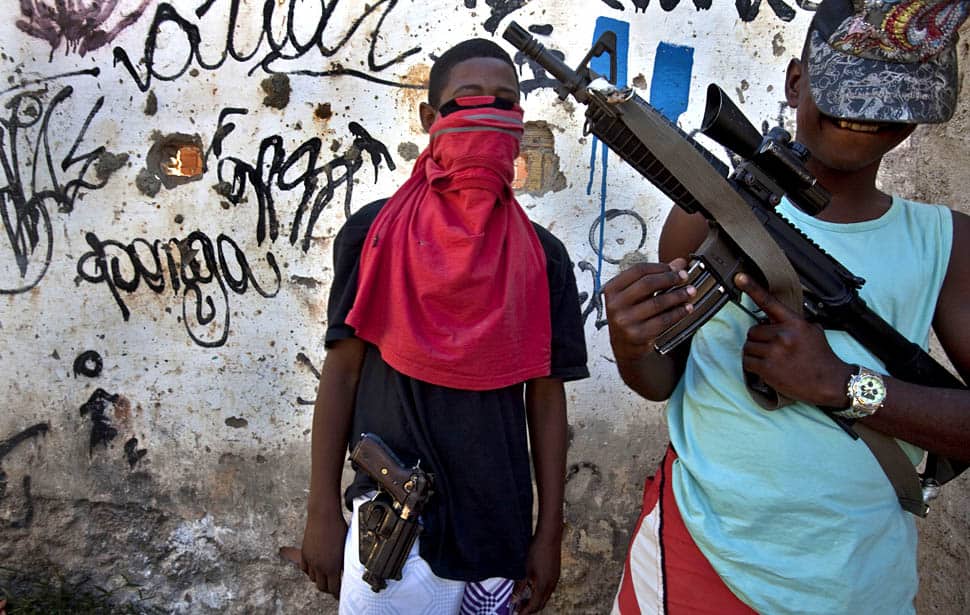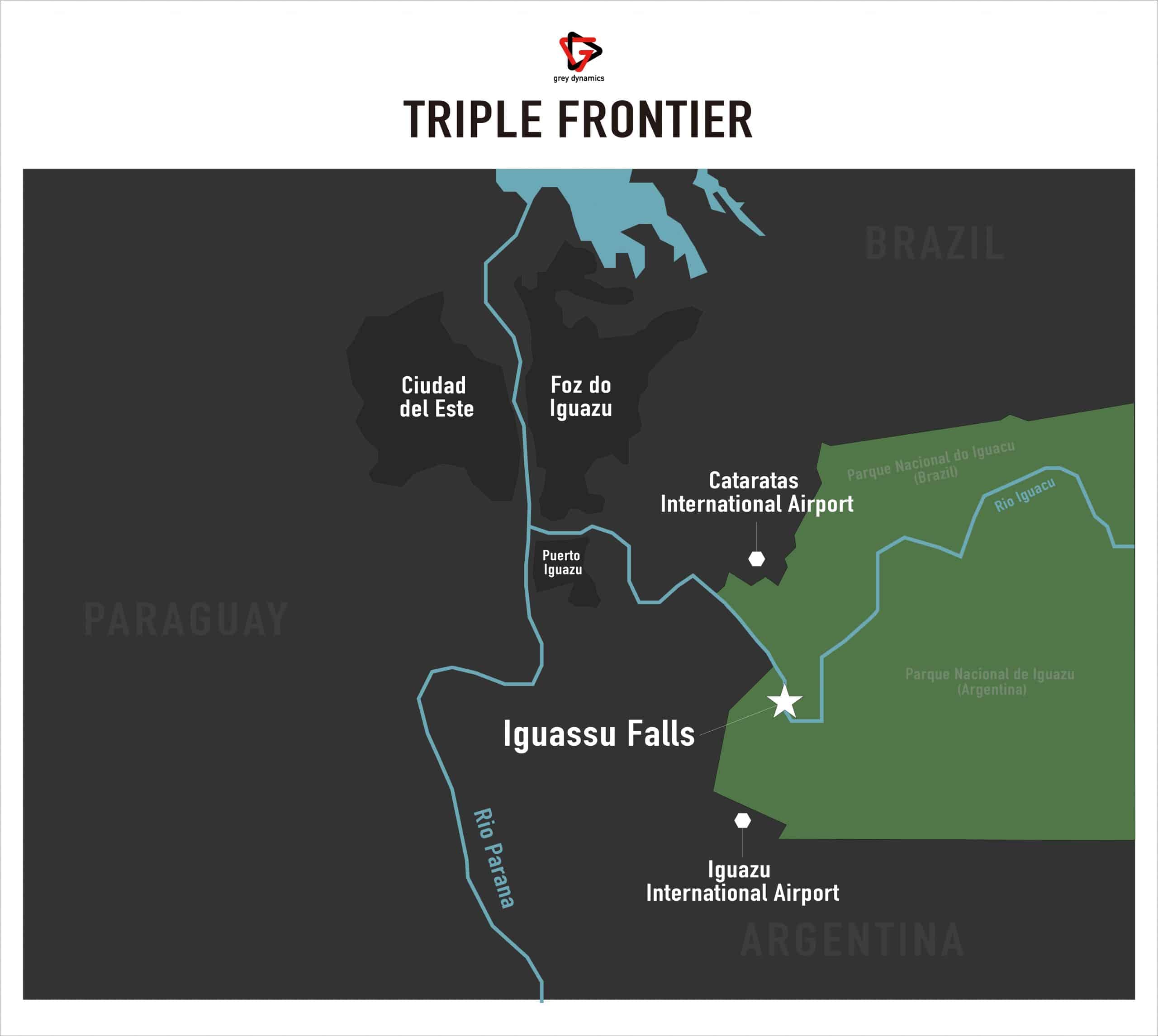The Triple Frontier or the Tri-Border Area (TBA) where Argentina, Paraguay and Brazil meet, is a popular tourist spot for the Iguazu Falls, but also a major smuggling route.
The area has also been called “the United Nations of crime,” a “terrorist safe haven,” and a counterfeiting capital. Although border regions are often referred to as “lawless”, the TBA for good reason has acquired a certain notoriety for its sheer amount of illegal activity. This is due in large part to its isolated jungle areas, but also its city centers that facilitate communications, transport, and banking services.
Although the Triple Frontier has been a hotbed of illegal activity for decades, it made headlines again this month when U.S. Secretary of State Mike Pompeo raised the issue of combatting transnational crime and terrorist financing in the area during a meeting on counterterrorism in Buenos Aires, Argentina. A State Department International Narcotics Control Strategy Report describes the TBA as “the center of a multi-billion-dollar illicit goods trade, including marijuana cultivation, the trafficking of Andean cocaine, and arms smuggling that facilitates significant money laundering in Paraguay.”
- The TBA spans the River Paraná,14 kilometers south of Itaipu hydroelectric dam, the world’s largest hydroelectric dam, which produces 75% and 25% of Paraguay’s and Brazil’s electricity respectively.
- During the 1970s, the Paraguayan city of Ciudad del Este, which borders Brazil, was established as a free-trade zone.
- Paraguay is the largest cannabis producer in South America and its production represents approximately 15% of the world’s total production; the country is also transit zone for weapons, pirated goods, human trafficking, and cocaine.
- According to a 2018 report by the Counter Extremism Project (CEP) and Asymmetrica, terrorists and criminals are able generate up to $800 million in revenue a week from activities in the TBA.
Armed to the teeth
Brazilian, Paraguayan and Argentine criminal groups all operate in the Triple Frontier. Also, many non-local mafias are known to operate in the TBA, including from other South American countries and as from as far as Africa and East Asia. However, the strongest groups to establish themselves in the area have been the Brazilian gangs in the drug trade to oversee the transport of Paraguayan marijuana and Peruvian and Bolivian cocaine into Brazil. Both the First Capital Command (Primeiro Comando da Capital – PCC) and the Red Command (Comando Vermelho) from Brazil control drug shipments and have grown in size and sophistication. The TBA is now known as South America’s largest drug market.
These groups often battle each other and inflict casualties on the wider population. In April 2017, in what was reportedly the biggest robbery in Paraguay’s history, the PCC attacked a transportation company and stole 12 million USD in Ciudad del Este with military-grade weapons and explosives. As with most of the drug war in the region, these weapons originate from the United States, either legally or otherwise. On the 29thJune, thousands of assault-style guns and explosives in south Florida to be shipped to the TBA were seized from traffickers, according to officials with Homeland Security Investigations (HSI) in Miami.
Branches twisting around the globe
Pompeo’s visit to Argentina coincided with the 25th anniversary of the 1994 car bomb attack on a Jewish community center in Buenos Aires. The attack left 85 dead and more than 300 wounded. Hezbollah has been accused of carrying out the attack and Iran masterminding it, but no one has been brought to justice and Iran denies it. In an opening statement at the counterterrorism conference, Pompeo said that “the roots of these terror groups may be many miles away, but their branches twist around the globe — raising funds, seeking recruits, probing for our weaknesses, challenging our defenses”.
With these comments, Pompeo was not only signaling out Venezuela’s ties to Hezbollah, but also in the Triple Frontier where the U.S. has long alleged that the group is active in fundraising and recruiting. It also has been claimed that the Buenos Aires attack could be traced back to TBA. In the 2018 report by political risk consultancy Asymmetrica, funded and jointly published by the Washington-based nonprofit Counter Extremism Project, it identified Hezbollah as laundering money through illicit activities in the TBA.
However, counterterrorism coordinators, American policymakers, and local government authorities have reaffirmed that no operational cells of Hezbollah have been found in the TBA. Even back in 2012, Latin American security expert Douglas Farah told Insight Crime that drug traffickers and terrorist groups were increasingly using the same intermediaries via “terrorist-criminal pipelines” that were often temporary. There has been no indication that this is still not the case in the TBA.
Cooperation is the key
What cannot be debated in the Triple Frontier is the level of criminality that shows no sign of abating. This is magnified by the complex web of cartels, corrupt politicians, financial intermediaries, and supply chains making it all possible. Essentially, it is a state within a state that poses a threat to the inhabitants of the three countries and elsewhere. Unfortunately, this situation is not unique on the continent. Similar hubs have formed in remote and isolated border regions, such as the border of Colombia, Peru and Brazil where drug trafficking and violence is rampant, or the border of Chile, Peru, and Bolivia.
What all these hotspots of smuggling could have in common is the need for cooperation. In a May INTERPOL summit of South American Police Chiefs in Foz do Iguacu, Brazil,a number of conclusions were reached on the TBA. However, a Brazilian Police Chief said it correctly: “only by addressing regional crime through a global lens can we tackle today’s pressing security challenges coherently and effectively. Cooperation is fundamental and the only way to realistically protect our national security, economies and people.”
Image: StreetGangs (link)



